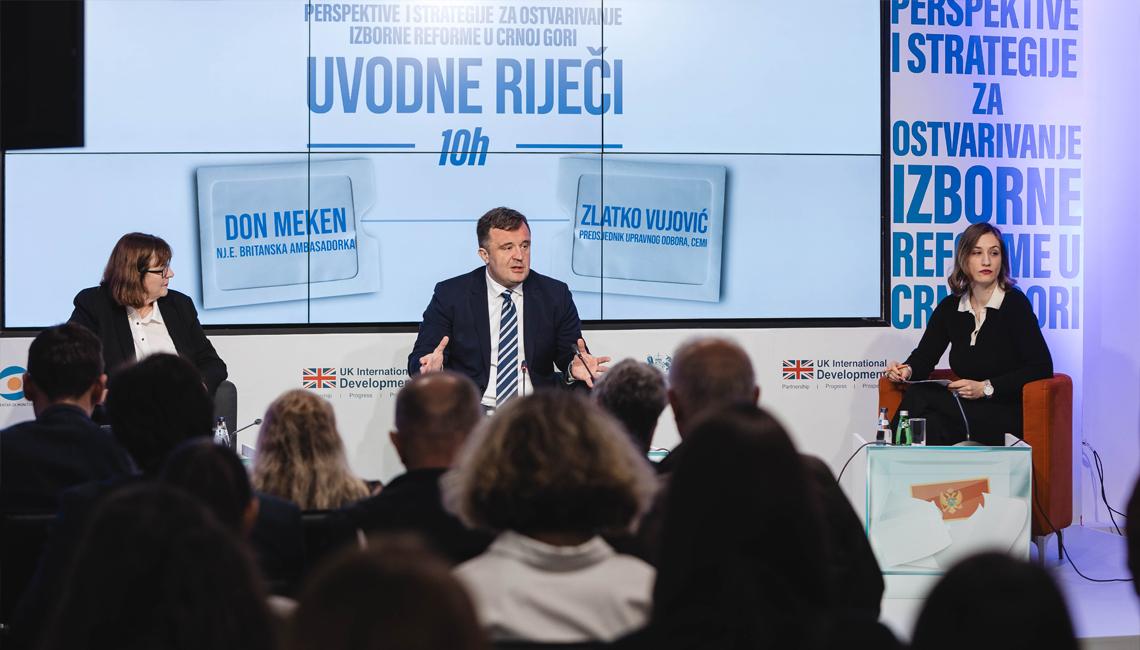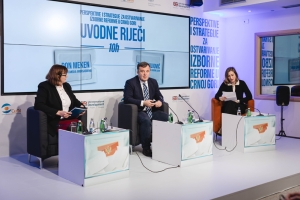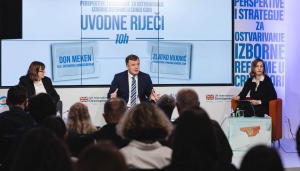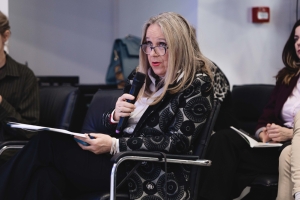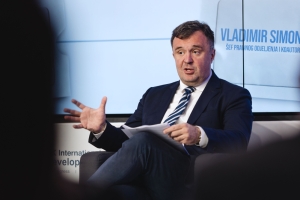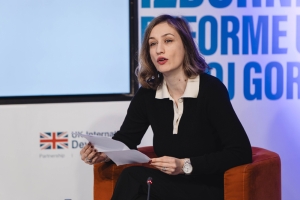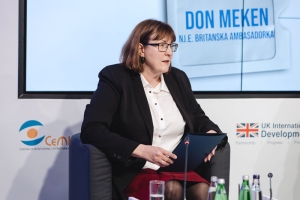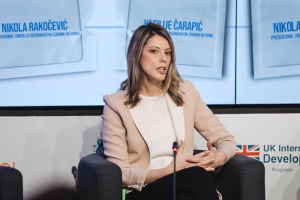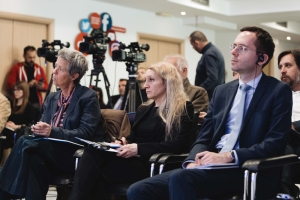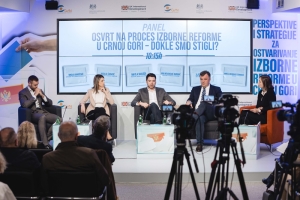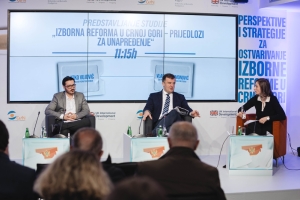In Montenegro, there is a high degree of political will for electoral reform to take place, and the priority of the Committee on Comprehensive Electoral Reform should be the issues of arranging the voter list, professionalizing and depoliticizing the State Election Commission (SEC) and the position of the president of the municipal election commission.
This was announced at our conference "Perspectives and Strategies for Achieving Electoral Reform in Montenegro", supported by the British Embassy Podgorica.
The President of the Governing Board of CeMI, Zlatko Vujovic, said that it seems to him that compared to earlier periods, there is a greater degree of political will for the electoral reform to take place.
"This is something that is encouraging and that the European Union (EU) and our other partners expect that we could become members of that community by 2028." I believe that we all have a duty to contribute to this and this is an opportunity that we should take advantage of," Vujovic believes.
Great Britain's Ambassador to Montenegro, Dawn McKen, said that electoral reform is not just a matter of changing the law.
"This is about transparency, inclusiveness and strengthening the very foundations of democracy. Electoral reform is a key step towards reducing the existing shortcomings that leave the elections here open to challenges, but it is also a step towards building trust," said McKen.
She welcomed the appointments of associate members of the Committee on Comprehensive and Electoral Reform, who were drawn from civil society and academia and supported by both the ruling and opposition parties.
"Their ideas and proposals will be an excellent complement to the discussion," McKen stated, saying that the British Embassy will continue to support Montenegro in continuing to build democracy and the rule of law.
During the panel "Review of the Electoral Reform Process in Montenegro - How Far Have We Come?", the President of the State Election Commission, Nikola Mugosa, believes that the central issue in Montenegro when it comes to electoral reform is related to the voter list.
"According to preliminary data recently presented by the Institute of Statistics, Montenegro has 633,000 inhabitants, of which 90,000 are foreigners. If we keep in mind that in Montenegro, we have approximately 95 thousand students who do not have the right to vote, and that there are over 540 thousand people registered in the electoral roll today, this tells us that Montenegro is facing an alarming figure when it comes to the up-to-dateness of the voter list", stated Mugosa.
He pointed out that the dominant cause of this situation is lack of promptness when deregistering and registering residence.
"In my opinion, this will be one of the most complex tasks to be solved in Montenegro. You cannot handle the voter list issue in an administrative manner. "My assessment is that this issue cannot be resolved in a short period of time," Mugosa said.
He pointed out that the SEC should be elected on meritocratic principles by members who are not members of political entities.
Mugosa, commenting on the issue of the election in Savnik, assessed that it should be among the first to be dealt with by the Committee on Electoral Reform.
"Savnik is a precedent that I hope will not have far-reaching consequences and that could be misused for all future election processes. "There is the root of the problem in the political election administration, which is entirely political bodies," said Mugosa.
Ana Novakovic Djurovic, Political Director of the Civic Movement URA, believes that the government and the opposition are showing responsibility and political will to begin the process of electoral reform at this moment.
"Unlike the representatives of the authorities who state that this can happen relatively quickly and that by autumn we can come out with more specific results, I would be more realistic in that assessment." I believe that if this parliamentary convocation completes the reform of the electoral legislation, it would be quite positive for the country," Novakovic Djurovic said.
He believes that it is extremely important that the Board received associate members - representatives of civil society and the academic community, stating that their knowledge will contribute additionally to the electoral reform.
"I believe that the work of the Board will be transparent and comprehensive," added Novakovic Djurovic.
She assessed that the Agency for the Prevention of Corruption did not contribute to increasing citizens' trust in the electoral system, stating that the competences of that institution should be considered very carefully in order to know what the expectations are.
"When it comes to the work of the Board, I think there is a consensus around some legal solutions and I should put them first on the agenda and solve them." I don't think the issue of open lists will find consensus. Also, I haven't heard a statement about the quotas to be increased and that the representation of women goes to 40 percent," said Novakovic Djurovic.
The Co-chairman of the Committee on Comprehensive Electoral Reform, Nikola Rakocevic, believes that political issues cannot be put aside, "because the Committee on Electoral Legislation is a par excellence political issue."
"However, I am optimistic that the government and the opposition will reach a consensus on this issue." Although there are huge differences between the government and the opposition, this Committee does not serve to overcome the political differences between the government and the opposition, nor to erase the ideological differences, that will not happen. However, this Committee is an important indicator of how ready political organizations in Montenegro are to cooperate for the sake of the general national interest, regardless of differences," said Rakocevic.
He announced that the opposition would propose an amendment to the decision on the establishment of the Committee, in accordance with the recommendation of a large number of non-governmental organizations, which would imply that the competences of the Committee should be expanded to include a set of media laws, the Law on the President and the Law on Criminal Procedure.
"Also, it is very important to form the Committee for Monitoring Foreign Influences, which can provide good analyzes and solutions in parallel with the Committee on Comprehensive Electoral Reform," Rakocevic pointed out.
Vujovic reminded that CeMI has been advocating for the professionalization of the SEC for more than a decade, stating that he is glad that there is a consensus of the representatives of the Board on this issue.
"Now we need to take advantage of the technical opportunities. It is necessary to improve the system for electronic identification of voters. If we had a reader that recognizes the voter based on the chip, electronically identifies it and retrieves the data that is stored, it would help us to have extensive statistics in real time that would provide a huge resource during and after the election day, among which is voter turnout." Vujovic said.
He assessed that as a society we will face a decline in voter turnout, stating that we must be ready to maintain their interest.
"I see the board as a great opportunity in the history of Montenegro that we can intervene in the electoral framework and the electoral system in a quality way," Vujovic said.
He believes that it should be considered to find a solution in the legal text or in some other way so that a two-thirds majority is not required for changes to each law.
Vujovic assessed that the SEC must be given the authority to take over the state process if the municipal election commission for some reason cannot conduct the election process.
"Now we have a case in Savnik, but it can happen anywhere. On the one hand, the SEC should be depoliticized, and in CeMI we believe that the president of the municipal election commission should be a professional and the party model should be maintained, and the SEC should take over the powers if the municipal election commission cannot carry out the election process," Vujovic added.
He said that CeMI's initiative was supported by CRTA and CeSID, which refers to the matching of voter databases in the Western Balkans and the introduction of a residence requirement of one year for local elections.
Speaking about the recommendations from CeMI's study "Electoral Reform in Montenegro - Proposals for Improvement", Vujovic said that it is necessary to ensure equality for the Roma community, in the same way as it is provided for the Croatian minority community in the current legal text.
"The rule on adding up the results of the minority lists of the same minority community, if none of them has passed the applicable legal requirement, should also apply to members of the Croatian and Roma people. If none of the minority lists alone exceeds 0.35 percent, their results will be added together and if they have more than 0.35 percent as such, they will receive a mandate. The mandate will be given to the minority list that had the most individual votes," explained Vujovic.
Head of the CeMI Legal Department and co-author of the study, Vladimir Simonovic, speaking about the recommendations related to the abuse of state resources, said that in order to prevent potential manipulation and abuse of social benefits during the elections, the Ministry of Health should officially declare the end of the COVID-19 pandemic and withdraw the decision that maintained the pandemic status, given that current data no longer support the maintenance of such a status.
"It is necessary for the Government to implement clear measures that guarantee an open and responsible distribution of social benefits, regardless of whether it is an election period or not." During the elections, a similar bipartisan ad hoc committee should be formed that would include members of the civil sector to ensure that social benefits are not misused," said Simonovic.
He pointed out that it is also necessary for the Government to be more transparent when it comes to expenses, especially in the election period, as if amendments to the Law on Financing Political Entities and Election Campaigns are necessary to ensure a ban on employment during the election campaign.
